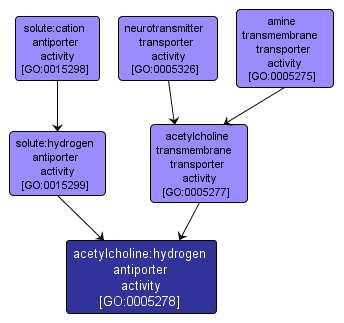GO TERM SUMMARY
|
| Name: |
acetylcholine:hydrogen antiporter activity |
| Acc: |
GO:0005278 |
| Aspect: |
Molecular Function |
| Desc: |
Catalysis of the transfer of a solute or solutes from one side of a membrane to the other according to the reaction: H+(out) + acetylcholine(in) = H+(in) + acetylcholine(out). |
Synonyms:
- acetylcholine:proton antiporter activity
|
|

|
INTERACTIVE GO GRAPH
|














